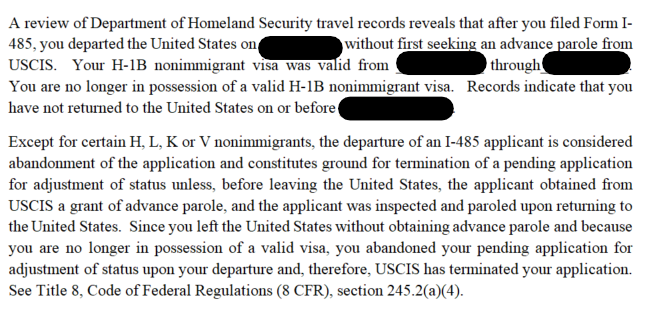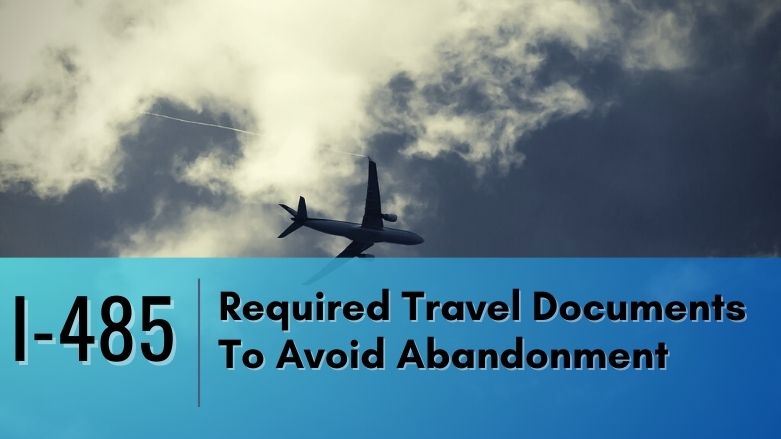Can I Travel Abroad While My I-485 Application is Pending? Risks and Considerations to Avoid Abandonment.
For applicants with pending I-485 applications, understanding the rules and requirements of international travel is essential in order to avoid denial due to abandonment. This article discusses the rules and requirements that must be followed to avoid denials of I-485 application due to abandonment as a result of international travel.
What Are the Rules for Travel Abroad with Pending I-485 Without Causing Abandonment?
The I-485 abandonment rules with respect to travel abroad are set forth in 8 CFR 245.2(a)(4) and specifically subsections (B) and (C):
8 CFR 245.2(a)(4)(ii)(B):
The travel outside of the United States by an applicant for adjustment who is not under exclusion, deportation, or removal proceedings shall not be deemed an abandonment of the application if he or she was previously granted advance parole by the Service for such absences, and was inspected and paroled upon returning to the United States. If the adjustment of status application of such individual is subsequently denied, he or she will be treated as an applicant for admission, and subject to the provisions of section 212 and 235 of the Act.
8 CFR 245.2(a)(4)(ii)(C):
The travel outside of the United States by an applicant for adjustment of status who is not under exclusion, deportation, or removal proceeding and who is in lawful H–1 or L–1 status shall not be deemed an abandonment of the application if, upon returning to this country, the alien remains eligible for H or L status, is coming to resume employment with the same employer for whom he or she had previously been authorized to work as an H–1 or L–1 nonimmigrant, and, is in possession of a valid H or L visa (if required). The travel outside of the United States by an applicant for adjustment of status who is not under exclusion, deportation, or removal proceeding and who is in lawful H–4 or L–2 status shall not be deemed an abandonment of the application if the spouse or parent of such alien through whom the H–4 or L–2 status was obtained is maintaining H–1 or L–1 status and the alien remains otherwise eligible for H–4 or L–2 status, and, the alien is in possession of a valid H–4 or L–2 visa (if required). The travel outside of the United States by an applicant for adjustment of status, who is not under exclusion, deportation, or removal proceeding and who is in lawful K–3 or K–4 status shall not be deemed an abandonment of the application if, upon returning to this country, the alien is in possession of a valid K–3 or K–4 visa and remains eligible for K–3 or K–4 status.
(Emphasis added)
Essentially, an I-485 applicant can travel abroad ONLY IF they meet AT LEAST ONE of these two criteria:
Scenarios: Can I Travel Abroad Without Abandoning My I-485?
A.I am in valid H-1B (or L-1, H-4, L-2) status, I will return to the US to continue working for the same employer and I have a valid H-1B visa stamp.
YES
B.I am in valid H-1B (or L-1, H-4, L-2) status, I will return to the US to continue working for the same employer but I do NOT have a valid H-1B visa stamp. I do not have a valid advance parole.
In the event an H-1B visa stamp cannot be issued at the consulate for return on H-1B status then the I-485 may be deemed abandoned. Also, a pending advance parole may be denied due to abandonment as well.
RISKY
C.I have an approved and valid advance parole document and I will return to the US before the expiration of my advance parole and while my I-485 remains pending.
YES
D.I am not maintaining H-1B status before my departure from the US and will not be able to return to the US on H-1B visa stamp to resume work for the same employer. I also do not have a valid advance parole.
Leaving the US will meet the criteria for the I-485 application to be considered abandoned and denied.
NO
What Does Abandonment Actually Look Like? Example of Request for Evidence or Notice of Intent to Deny.
Below is an example of what an I-485 denial due to abandonment looks like:

A request for evidence (RFE) or a notice of intent to deny (NOID) will contain similar language. The USCIS adjudicator will generally review documentation in the file against USCIS information (such as travel history, advance parole filing/approval history) and if they suspect that a I-485 may be abandoned, they are likely to focus on the issue.
I Traveled Abroad Without Valid AP or H-1/H-4/L-1/H-2 Status and Visa: What to Do If I Suspect My I-485 May Be Denied Due to Abandonment?
Given the significant case volumes, it is possible that a USCIS adjudicators may not take the time to thoroughly review all aspects of an I-485 application, including check for possible abandonment as a result of international travel post-I-485 filing. As a result, it is possible to obtain I-485 approval even when the application should have been denied.
Erroneous I-485 green card approvals like this are very unfortunate and extremely difficult to correct; We recommend taking proactive steps if it is clear that I-485 has been approved in error; not doing anything may cause significant issues in the future, including getting the green card rescinded and facing a Notice to Appear (NTA) as part of removal proceedings.
If a I-485 applicant ends up traveling abroad (and returning to the US) without either a valid advance parole before their US departure or valid status and visa stamp, also before their US departure, then they will need to understand that their pending I-485 application is subject to denial due to abandonment.
The next steps and options are extremely situation and case specific so we encourage seeking legal guidance (feel free to book a consultation with one of our attorneys). However, the options may be to:
- Withdraw the pending I-485 and file a new I-485 application. Not suitable if there is no current priority date allowing I-485 filings or if the applicant is not in valid nonimmigrant status (such as H, L, K). Also not suitable if the candidate has changed employers from the I-140 petition or if the I-140 sponsored position has changed significantly. Depending on the circumstances, this may require a new H-1 or L-1 petition filing and possibly H-1B stamping abroad for a new US reentry on H/L status.
- Withdraw the pending I-485 and seek NVC/consular processing. May be suitable if the applicant is planning to spend time outside of the US. May also not be suitable if the applicant is no longer employed by the I-140 sponsoring employer.
While it may be tempting to do nothing and hope for USCIS error in approving the pending I-485 application even when it should be denied, we certainly do not recommend doing so. Our office is ready to help analyze a possible abandonment situation and provide suggestions and options. Contact us for a quote or book a phone consultation.
What Happens After I-485 is Denied?
An I-485 application denial has some immediate and significant consequences. First, if the applicant has not otherwise continued to maintain nonimmigrant status (such as H-1B or H-4), they are considered to be unlawfully present in the US (more about unlawful presence and its consequences). If the applicant is maintaining nonimmigrant status (such as having entered the US on H-1B visa stamp and working on H-1B status), they they are likely to be allowed to continue to remain in the US and be employed based on valid H-1B status.
Second, generally, if there are pending EAD or AP applications, these applications will be denied because the underlying I-485 application has been denied. With respect to already approved and valid EAD documents, USCIS will likely indicate in the I-485 denial notice that such EAD applications are to be invalidated. The same is true for advance parole documents.
This is what the relevant section of the I-485 denial notice may look like with respect to the continuing validity of an EAD (APs are very similar).
Third, I-485 denial may be challenged by submitting an I-290 Motion to Reopen or Motion to Reconsider. Depending on the specific case specifics this may or may not be a good idea. Our office can provide an analysis and a quote.
Webinar Discussion
There are many aspects to successfully navigating a pending I-485 application process, including travel abroad, AC21 porting to a new employer, EAD/AP extensions and many others. This is especially true when I-485 applications may be in process for a number of years due to visa number retrogression. We offer a recording of our live webinar session where attorneys of our firm discuss and analyze a variety of aspects of the pending I-485 process.
Conclusion
With many I-485 applicants waiting for multiple years for approval and especially after an I-485 is ported to a new employer, it is extremely important to understand the travel requirements for protecting a pending I-485 from denial due to abandonment.
Our office is happy and available to assist with case evaluation or assistance as needed. Please do not hesitate to contact us or consider our consultation options. Also, please visit us again or subscribe to our free weekly newsletter to ensure that you obtain this and related immigration-related news and announcements.
Related News and Articles
The Capitol Immigration Law Group has been serving the business community for over 15 years and is one of the most widely respected immigration law firms focused solely on U.S. employment-based immigration. Disclaimer: we make all efforts to provide timely and accurate information; however, the information in this article may become outdated or may not be applicable to a specific set of facts. It is not to be construed as legal advice.


